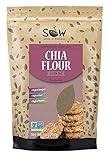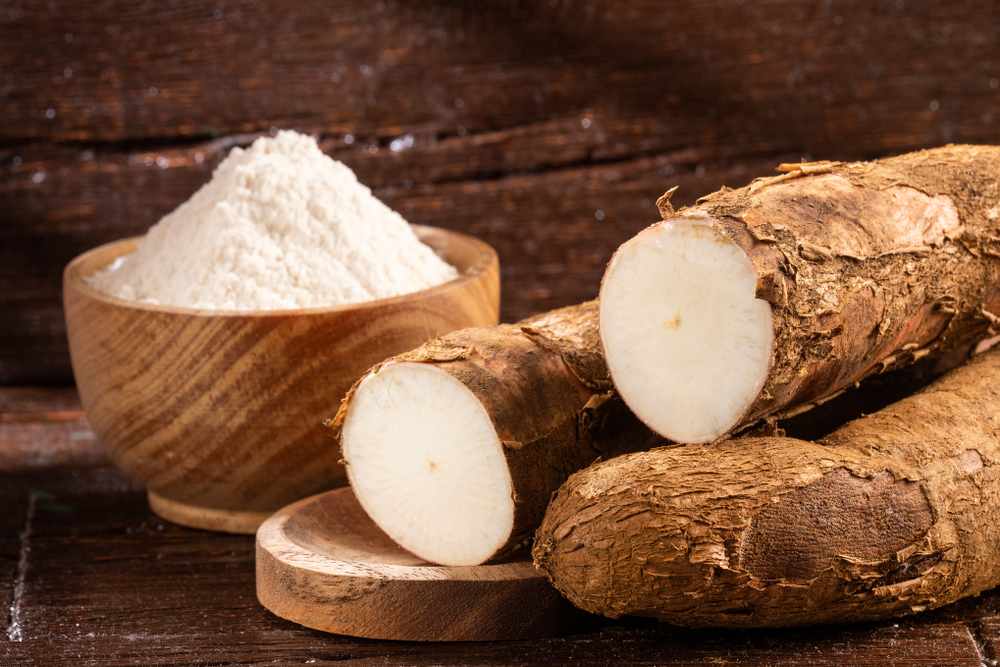Do you ever wonder what that brown root vegetable is at the supermarket and if it fits your dietary preferences? Cassava, otherwise known as yuca or manioc, is a dark brown, woody vegetable that falls into the same category as sweet potatoes and potatoes. But is it any better than those tubers for the keto diet?
Cassava is not keto. The ketogenic diet is a low-carb, high-fat program aiming to use fat rather than carbohydrates for energy use. Along with other starchy root vegetables, cassava is too high in carbohydrates and too low in fat for keto. The best keto alternatives to cassava include Kroger Turnip, Kroger Organic Fennel Root, or Galil Hearts of Palm.
Continue on to learn more about cassava and its potentially dangerous compounds as well as its nutritional value and even a few keto-friendly alternatives. Keep reading to learn more!
Contents
What Is Cassava?
Cassava is a vegetable that is native to South America. The plant can be used for its leaves, seeds, and most commonly its root. Cassava root is actually the third most commonly used carbohydrate in tropical and subtropical regions. It is typically served boiled or ground to a flour.
Cassava can be either sweet or savory and is often described to have a nutty flavor. When it’s cooked, has a similar flavor and texture to potatoes. In the United States, it is used to make tapioca. I grew up eating tapioca pudding at my grandmother’s house and never knew it came from the cassava root, let alone what cassava was!
Cassava Benefits
Although cassava is not a keto-friendly food, it does offer nutritional benefits for many. Cassava is an important staple for many countries, especially those in tropical regions because it can grow in even the toughest soil. It contains resistant starch which has a few health benefits such as supporting a healthy digestive system, improving blood pressure, and promoting meal satiety.
Is Cassava Poisonous?
An important thing to note, cassava should never be eaten raw. When it is not cooked, it contains poisonous amounts of cyanide, a toxic chemical that can impair thyroid and nerve function. It is also associated with paralysis and organ damage, which can be fatal. Therefore, cassava should only be eaten cooked and not too frequently to avoid these negative effects.
The Keto Diet
The keto diet is a nutrition program that requires eating primarily fat (about 80% of your diet). The last 20% will come from mostly protein and very few carbs. This diet is used to put your body into a state called ketosis. Ketosis occurs when very few carbs are present and the body must use ketones, which are made when stored fat is broken down for energy, rather than stored glucose for energy.
Research from this diet shows that it may be beneficial for diabetes, cancer, epilepsy, and Alzheimer’s disease as well as promote weight loss. It’s important to note that the keto diet can be hard to sustain because eating any amount of extra carbohydrates stops ketosis and revert your body back to using glucose storing processes. Long term studies also show poor results for weight loss maintenance.
Why Cassava Is Not Keto Friendly
Cassava is not classified as a keto-friendly food due to its very high carbohydrate content. It’s also very low in fat, which doesn’t help with its keto diet suitability. As mentioned above, the keto diet requires the person to eat very low amounts of carbohydrates every day. On average, keto diets will aim for somewhere between 20 and 50 grams of carbohydrates per day. Cassava packs in 39 grams of carbohydrates in just one ½ cup serving, which almost double some keto followers’ daily goals. Therefore, this is not a keto-friendly food.
Starchy Vegetables and the Keto Diet
Starchy vegetables are vegetables that contain just that- starch. Starch is a type of carbohydrate that your body breaks down into glucose. This group of vegetables is higher in calories and carbohydrates than non-starchy vegetables. They’re also lower in fiber, which means they may not keep you feeling as full as other non-starchy vegetables. This category includes root vegetables, tubers, or squashes, more specifically things like potatoes, sweet potatoes, corn, carrots, and winter squash.
Nutritional Content of Cassava
Kroger Cassava Root, Sliced
Ingredients:
- Cassava Root
Nutritional Information:
In a ½ cup serving of sliced cassava root, there is:
- Calories: 166.5
- Total Fat: 0.3 g
- Saturated Fat: 0 g
- Cholesterol: 0 g
- Sodium: 14.4 mg
- Carbs: 39 g
- Fiber: 1.9 g
- Sugar: 1.8 g
- Protein: 1.4 g
Anthony’s Cassava Flour
Ingredients:
- Cassava
Nutritional Information:
In a ¼ cup serving of Anthony’s Cassava Flour, there is:
- Calories: 110
- Total Fat: 0 g
- Saturated Fat: 0 g
- Cholesterol: 0 g
- Sodium: 10 mg
- Carbs: 26 g
- Fiber: 2 g
- Sugar: 1 g
- Protein: 0 g
Bob’s Red Mill Small Pearl Tapioca
Ingredients:
- Tapioca Starch (Cassava)
Nutritional Information:
In a ¼ cup serving of Bob’s Red Mill Small Pearl Tapioca, there is:
- Calories: 120
- Total Fat: 0 g
- Saturated Fat: 0 g
- Cholesterol: 0 g
- Sodium: 0 mg
- Carbs: 28 g
- Fiber: 0 g
- Sugar: 0 g
- Protein: 0 g
Review of Cassava Nutrition
As seen from the nutritional information above, cassava is very high in carbohydrates and low in fiber and protein. In its unprocessed, sliced form, it has some additional nutrients, including small amounts of protein and fat, that both the flour and tapioca pearls do not. This is because the more cassava is broken down, the more nutritional value is lost. For all of these forms, though, the majority of its nutritional content comes from carbohydrates in the form of starch.
Alternatives to Cassava
Kroger Turnip
Although turnips are a root vegetable, they are lower in carbohydrates than other root vegetables which makes them a good, keto-friendly swap for cassava. It does contain about 8 carbs per turnip, however, it does offer some fiber, so it only rings in at about 6 net carbs. They can be served boiled as well as baked or sautéed, making them a very versatile vegetable.
Ingredients:
- Turnip
Nutritional Information:
In one serving of turnips equaling 1 medium turnip, there is:
- Calories: 34
- Total Fat: 0.1 g
- Saturated Fat: 0 g
- Cholesterol: 0 g
- Sodium: 82 mg
- Carbs: 8 g
- Fiber: 2.2 g
- Sugar: 4.6 g
- Protein: 1.1 g
Kroger Organic Fennel Root
Fennel root is a keto-friendly vegetable to replace cassava. While it rings in a little higher than other vegetables at 3 net carbs, it still fits within the keto diet and can be used in moderate amounts.
Ingredients:
- Fennel
Nutritional Information:
In a 1 cup serving of Kroger Organic Fennel Root, there is:
- Calories: 27
- Total Fat: 0.17 g
- Saturated Fat: 0 g
- Cholesterol: 0 g
- Sodium: 45 g
- Carbs: 6.34 g
- Fiber: 3 g
- Protein: 1 g
Galil Hearts of Palm
 Hearts of palm, known as palmitos and palm hearts, are another great keto-friendly alternative for cassava. Coming from the innermost part of palm trees, these unique vegetables and offer about 2 net carbs per serving as well as a good amount of protein. Both of these attributes make it a good choice for keto dieters.
Hearts of palm, known as palmitos and palm hearts, are another great keto-friendly alternative for cassava. Coming from the innermost part of palm trees, these unique vegetables and offer about 2 net carbs per serving as well as a good amount of protein. Both of these attributes make it a good choice for keto dieters.
Keep in mind, this particular brand uses sodium for this canned good is. If you are looking to reduce your sodium intake, you can drain and rinse this product or any other canned items or look for low sodium/salt-free canned items at the store.
Ingredients:
- Hearts of Palm
- Water
- Salt
- Citric Acid
Nutritional Information:
In a 1 cup serving of Galil Hearts of Palm:
- Calories: 41
- Total Fat: 0.9 g
- Saturated Fat: 0.2 g
- Cholesterol: 0 g
- Sodium: 622 g
- Potassium: 622 mg
- Carbs: 6.8 g
- Fiber: 3.5 g
- Sugar: 0 g
- Protein: 3.7 g
SOW – SEEDS OF WELLNESS Chia Seed Flour
 Chia Seed flour is a good cassava flour alternative for the keto diet. While it is somewhat high in carbohydrates, most of the carbohydrates come from fiber, meaning the net carbohydrate content is very low. It is also gluten-free and high in protein as well as healthy fats, which is beneficial for not only the keto diet but most diets overall.
Chia Seed flour is a good cassava flour alternative for the keto diet. While it is somewhat high in carbohydrates, most of the carbohydrates come from fiber, meaning the net carbohydrate content is very low. It is also gluten-free and high in protein as well as healthy fats, which is beneficial for not only the keto diet but most diets overall.
Ingredients:
- Micro-Milled Chia Seeds
Nutritional Information:
In a ½ cup serving of Sow- Seeds of Wellness Chia Seed Flour, there is:
- Calories: 149
- Total Fat: 4.5 g
- Saturated Fat: 0.5 g
- Cholesterol: 0 g
- Sodium: 1.4 mg
- Carbs: 4 g
- Fiber: 28 g
- Sugar: 0.4 g
- Protein: 12.5 g
Modern Mountain Lupin Flour
 Lupin flour is made from sweet lupin beans, which is a legume closely related to peanuts and soybeans. This flour is also a good cassava flour alternative for the keto diet. It is high in fiber and is low in net carbs and boosts high protein and some plant-based fat, as well.
Lupin flour is made from sweet lupin beans, which is a legume closely related to peanuts and soybeans. This flour is also a good cassava flour alternative for the keto diet. It is high in fiber and is low in net carbs and boosts high protein and some plant-based fat, as well.
Ingredients:
- 100% Sweet White Lupin Flour
Nutritional Information:
In a ¼ cup serving of Modern Mountain Lupin Flour, there is:
- Calories: 110
- Total Fat: 3 g
- Saturated Fat: 0 g
- Cholesterol: 0 g
- Sodium: 4 mg
- Carbs: 11 g
- Fiber: 10 g
- Sugar: 0 g
- Protein: 10 g
Conclusion
Based on everything we’ve covered so far, we can say that cassava is not suitable food for the ketogenic diet. It is very high in starchy carbohydrates with very limited fat and protein, which does not fit into this diet. Try using turnips, fennel root, chia seed flour, or lupin flour, all low in net carbohydrates, to make your current cassava dishes keto-friendly.
Related Questions
Is cassava gluten free?
Yes, cassava is gluten free. Cassava flour is actually a great gluten-free alternative for wheat flour for those who are gluten intolerant or have Celiac disease.
Is cassava vegan?
Yes, cassava is a completely vegan and plant-based product.
Is cassava low in fat?
Yes, cassava root is very low in fat, offering only 0.3 grams of total fat per ½ cup serving.
